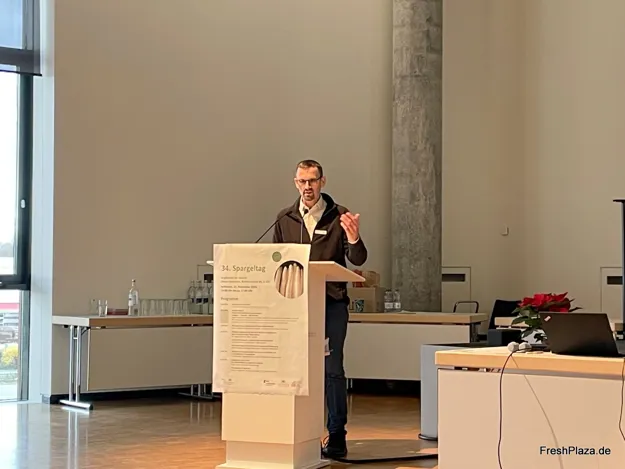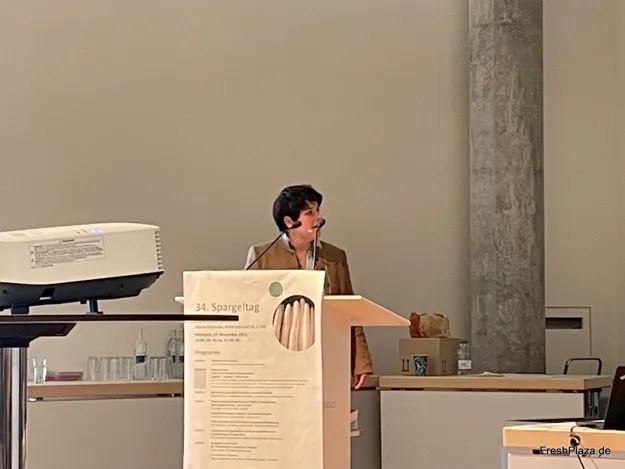34th Asparagus Day at the Karlsruhe Trade Fair Center
“The more we talk about asparagus, the more we will sell”
In the third week of November, the 34th Asparagus Day took place parallel to the double trade fair expoSE & expoDirekt 2023 in Karlsruhe. Frederick Euler, Head of the Karlsruhe Agricultural Office, looked back on the 2023 season in his welcoming speech. The year began with extremely low temperatures, while high rainfall of 80 mm instead of 50 mm and little sunshine determined the weather in March. From March 27, the harvest got off to a relatively slow start with triple cover. In April, we also had to contend with low night temperatures and even frosty nights.”
 Frederick Euler.
Frederick Euler.
Tentative demand, low prices
“Many farms had no asparagus at all at Easter and only very small harvests in the following weeks. Demand was tentative and prices were low. It was still very cool at the beginning of May, which meant that even later plants were slow to get started. It was not until the end of May that rising temperatures led to better yields and better quality. High temperatures and drought followed again at the beginning of June, with the effect that the first plants, especially three-year-olds, were taken out. In the end, it can be said that we had low but stable demand in direct marketing. The weather conditions led to a reduction in acreage and lower supply,” says Euler.
 Philippe Sigrist and Jean-Charles Jost.
Philippe Sigrist and Jean-Charles Jost.
Marketing strategies for Alsace asparagus
Jean-Charles Jost, President of the Asperge d’Alsace asparagus growers’ association founded in 1991, and his colleague Philippe Sigrist presented facts and figures on asparagus cultivation in Alsace and also talked about marketing strategies for Alsace asparagus. The Landes, Gard, Gironde, Bas-Rhin and Mainte-et-Loire departments are among the largest asparagus-growing regions in France. In 2018, the total harvest volume in France was 20,680 tons. In 2022, the area under cultivation in the Alsace region was 496 hectares, of which 28 hectares were used for organic cultivation. However, the total area of asparagus production in Alsace is 565 hectares. “This has to do with the fact that there are also some producers who are not part of the association,” says Sigrist. Of the 121 producers, each cultivates around 4.7 hectares. The production potential in 2022 amounted to 2379 hectares.
In order to finance communication, the association members have to pay 220 euros per hectare per year to the association. The budget of the association amounts to a total of 90,000 euros. Of this, 66,000 euros is collected by the producers and further money is collected from restaurateurs and other partners. Of this income, 81,000 euros alone is invested in communication. Advertising measures include the use of various stickers on the packaging of partner companies that produce eggs and mayonnaise, for example. The entire income is also reinvested. Investments were also made in a TV sport, in communication via radio and the press. The money is also directly reinvested in communication. “The more we talk about asparagus, the more we will sell.”
 Sarah Schreiber.
Sarah Schreiber.
Communication with employees for better retention
“How do I bind good employees to my business?” was the title of the presentation by Sarah Schreiber, Operations Manager at Spargel- und Erdbeerhof Schreiber. Together with her husband Dirk Schreiber, she runs the farm in Gerolsheim, which employs two permanent staff and a further 70 to 100 employees from Germany, Poland and Romania. “In 2020, we also had problems getting employees from Poland and Romania, which is why we put out a call for German employees. How do we manage to retain employees on our farm? Have we developed loyalty to us or to our farm?” It is also thanks to the farm’s reputation that some employees were former customers.
Schreiber recommends planning fixed rituals for welcoming employees and paying attention to the first impression of the farm. “Can I welcome the workers in their language? What is their first working day like? Is there a road book? Who are the contact persons and who is responsible for which matters? Employees should feel welcome and know what to expect. Some employees are not able to give change properly. You have to know that and then respond accordingly.” Clearly communicating the house and yard rules is also part of communication.
We will start interviewing candidates in February. Basically, we divide up the induction process. Since Covid, we have also had many German employees. To make the work easier for all employees, we have made instructional videos explaining, for example, how an asparagus plant develops, how difficult it is to cut asparagus and how the sorting system works.
To address the individual needs of employees, Schreiber uses Maslow’s pyramid of needs as a guide. Various factors such as safety and health are taken into account. “It is also important to let employees know when they have done something right. In addition to fair, appropriate pay, a fixed structure and organization in the workplace is also important so that employees can also contribute their own ideas. We also celebrate parties for employees so that they can get to know each other.” Barbecues at the end of the season, anniversaries, birthdays and public holidays are also a fixed part of the annual planning. Her conclusion: “There is no invisible leash that you can use to keep employees with you in the long term. Keeping employees happy is a daily job.
The second part of Asparagus Day, in which water consumption and the minimum wage are among the topics discussed, will follow in the coming days.
For more information:
https://www.landkreis-karlsruhe.de
https://asperges.alsace
https://www.spargel-schreiber.de